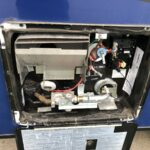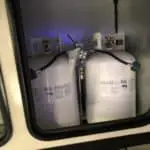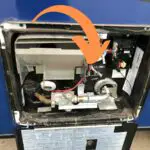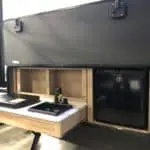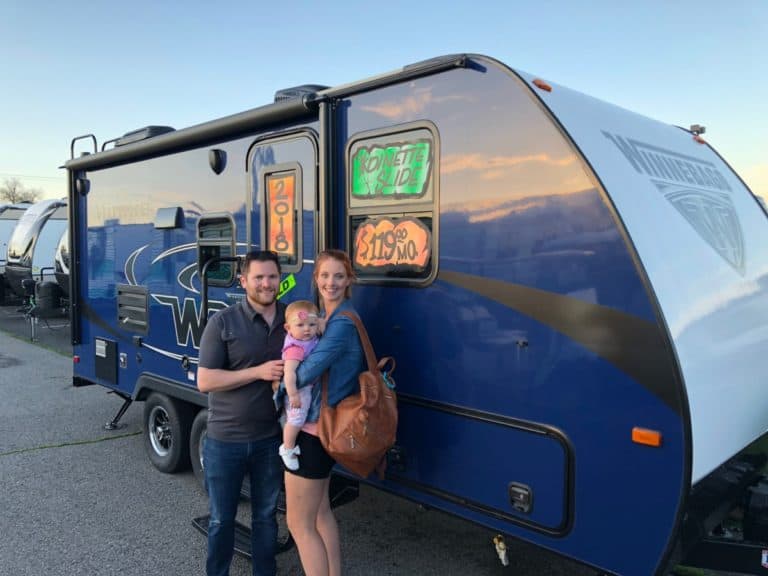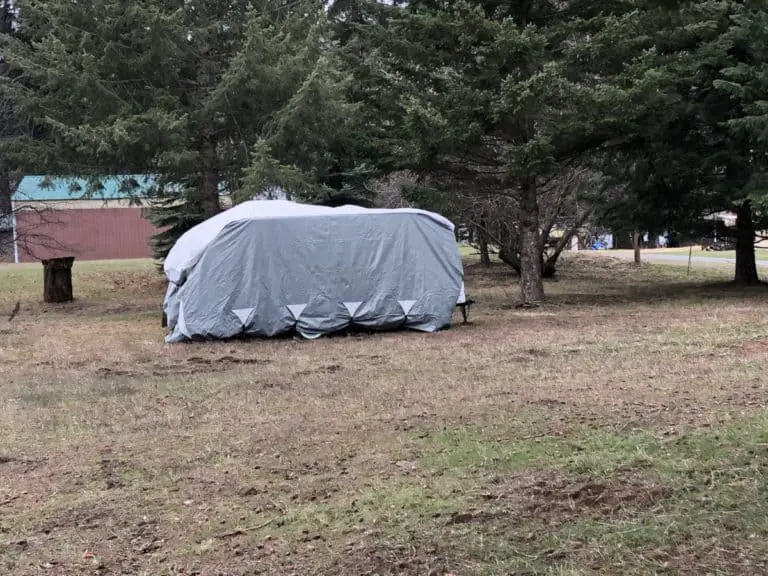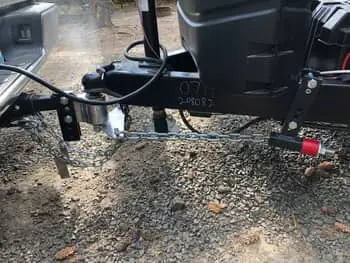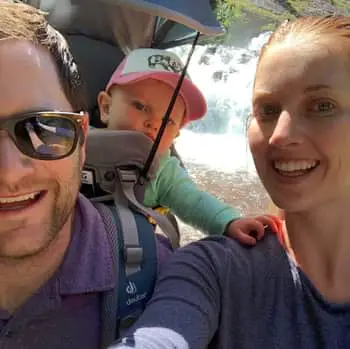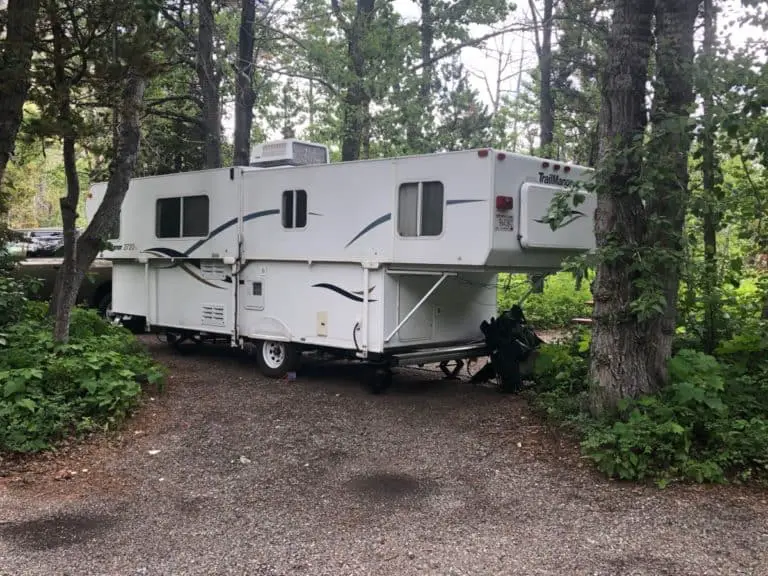How To Turn On And Use Your Electric Or Gas Water Heater In Your RV
Are you about to use your RV for the first time? I’m assuming this to be the case if you’re learning how to turn on the water heater, and I hope it’s the start of many adventures. The benefit of RVing as opposed to camping is that at least some of your home comforts come with you. One of these is a supply of hot water, but it does mean learning how to turn on and use the gas or electric water heater in your RV.
To turn your RV water heater on, first make sure it is full with water. Next find your RV control panel and if you have a gas/electric water heater and are plugged in, turn the electric on. If you aren’t plugged in or only have a gas water heater, then turn gas on. You can use both gas and electric.
So, the shiny new RV is stocked up, and ready to hit the highways and byways of whatever land your heart desires. RV water heaters are generally simple, reliable devices, and used correctly and looked after will last for the life of your RV. Depending on which type of water heater you have, you’ll need to carry out a definite routine to get started and to ensure that there’s water for that relaxing shower at the end of the day.
Turning On And Using Your RV Water Heater
To ensure that you have hot water when you need it, there are some steps to take and knowledge to be gained, so let’s get started.
Never Turn On Your Heater Before Filling The Tank
The first rule with a tank water heater is to get water into the tank before turning on the power. Failure to do this could result in serious damage and expensive repairs.
Most RV tanks hold 6 or 10 gallons of water, so a full tank weighs between 50 and 85 pounds, which can affect your fuel economy and road-handling. If you’re heading for a serviced campsite, consider filling up when you arrive.
How to Fill your RV Water Heater Tank
Hook up a clean hose to either the city water connection or your fresh water tank intake, and the other end to the supply spigot, whether it’s your garden tap at home or the supply provided at the campsite.
Make sure to use a drinking water safe hose and a water filter to ensure you have the best water quality. This is the water hose and RV water filter combination we use.
If you are using your city water connection, your RV water tank should fill automatically, if you are filling it with your fresh water tank, you will need to turn on your RV water pump.
- If you aren’t getting water in your RV water heater tank, make sure that the heater bypass valve is closed. If it’s left open, as often happens when the RV has been winterized, water will flow from the tank to the cold water taps and not to the heater.
- Now turn on a hot water tap, and let the water run. To start, it may splutter and flow hesitantly because there is air in the pie, but this will clear quickly, and the water will flow freely.
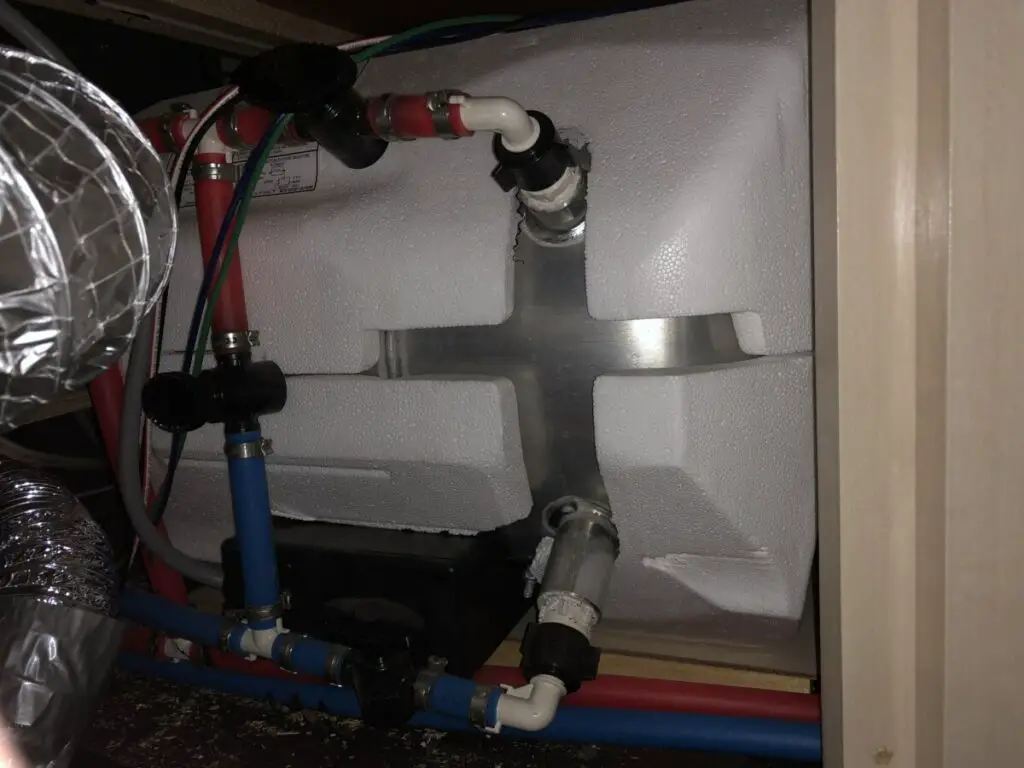
With a tankless heater, there’s no tank to fill. Water will flow directly to the heat exchanger in the heater. You don’t need a bypass line either, although there ideally should be a bypass facility if you want to clean out the supply line in the future.
Turning On a Gas Water Heater in your RV
Gas heaters have become more sophisticated over the years, and most have automatic ignition, which makes life a lot simpler.
Autostart Ignition System
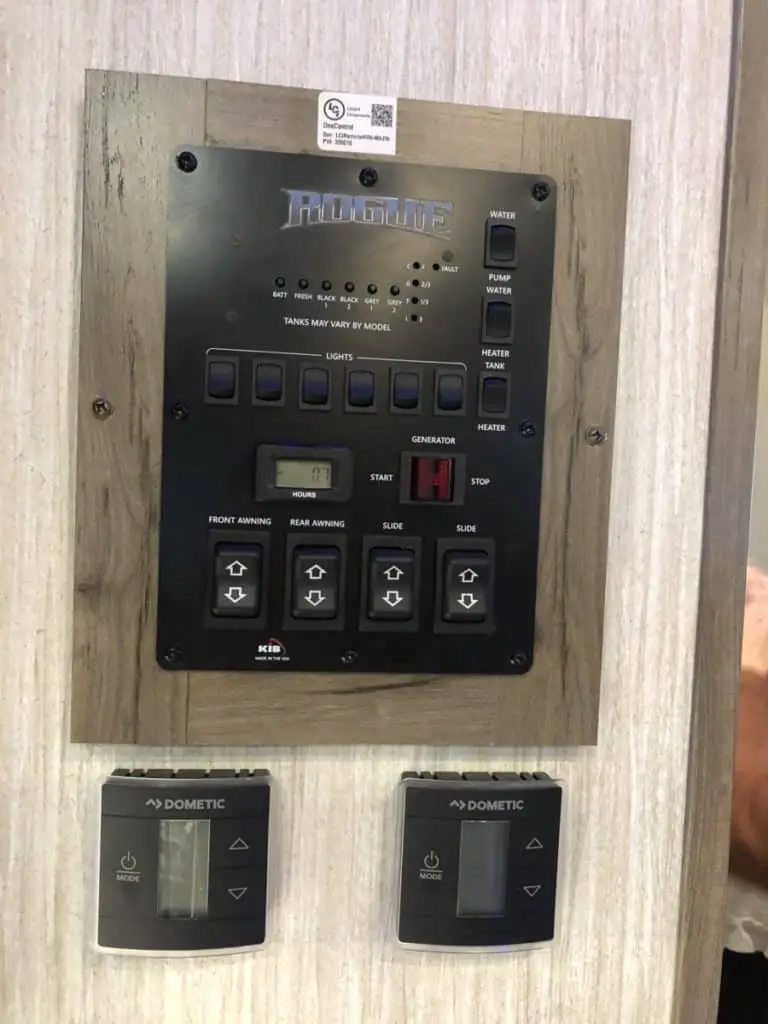
Step 1:
All you need to do is find the switch on your RV control panel marked “HEATER” or “GAS” and flip it on.
Step 2:
Check the indicator light which tells you whether the action has worked and that the heating process has begun. If it doesn’t light up repeat Step 1 until it does.
Turning On An Electrical Water Heater
An electrical heater draws a substantial current, so it will only work if you have access to an electrical power source such as at an RV park or generator.
Step 1:
If you are in a campsite with power outlets available, hook up the RV to the outlet provided or your generator.
Step 2:
Switch the water heater on using the switch situated in the cabin.
Many RVers prefer electrical water heaters because they are environmentally friendly, don’t require exhaust vents for burnt gas, and as long as you’re plugged into an electrical outlet, you’ll never run out of hot water.
Operating a Combination Gas/Electric RV Water Heater
When operating a combination gas and electric water heater in your RV, it is essential to know the basic steps to ensure proper functionality and safety. Here are the necessary guidelines to operate your combination RV water heater effectively.
First, locate the water heater control panel in your RV. This panel will allow you to switch between gas and electric modes, as well as control the temperature settings. Turn on the propane supply if you plan to use the gas option. Ensure that your RV is connected to a power source if you prefer the electric mode.
Now, select the desired mode (gas or electric) on the control panel. It’s possible to use both modes simultaneously, which can result in faster heating and recovery times. Once you have chosen your preferred mode, switch on the water heater. You will hear a clicking sound as the igniter works to light the propane burner in gas mode. In electric mode, the heating element will start to warm the water without any noise.
Keep an eye on the control panel during the initial startup. In gas mode, the control panel’s indicator light may flash, signifying that the burner is trying to ignite. If the burner fails to ignite after several attempts, a fault indicator may illuminate, requiring you to troubleshoot the issue.
Monitor the water temperature throughout your stay at the RV park or campground, adjusting the temperature settings according to your needs. Be cautious with higher settings, as scalding may occur more quickly.
To turn off the combination RV water heater, simply switch off the desired mode (gas or electric) on the control panel. If you plan to store the RV or travel to a new location, remember to switch off the propane supply and disconnect from the power source.
By following these steps, you can confidently and efficiently operate your combination gas and electric water heater in your RV, ensuring a consistent supply of hot water during your travels.
Troubleshooting Common Issues on your RV Water Heater
Pilot Light Problems
If your pilot light is not staying lit, there may be an issue with the thermocouple, ignitor, or the gas valve. First, check the thermocouple to ensure it’s properly positioned and clean. If necessary, adjust its placement or replace the thermocouple. If the issue persists, check the gas valve for any signs of damage or debris. Always remember to turn off the gas before working on any gas-related components. Ignitor not lighting at all, here’s how to test it. If you still can’t figure it out, here’s an article on the top 10 reasons your RV water heater won’t stay lit.
Heating Element Issues
If your RV water heater is not producing hot water, the heating element could be at fault. To check the heating element, turn off the power and remove the access panel. Use a multimeter to test the element for continuity. If there’s no continuity, replace the heating element. If the element is functional, check the surrounding components for any visible damage or corrosion.
Thermostat Malfunctions
A faulty thermostat can also lead to inconsistent water temperatures. Test the thermostat using a multimeter by checking for continuity. If it’s not functioning properly, replace it with a new one. Be sure to choose a thermostat with the correct temperature rating for your specific water heater model.
Anode Rod Replacement
The anode rod in your water heater helps to prevent corrosion and extend the life of the tank. Regularly check the anode rod and replace it if it’s worn out or corroded. It’s recommended to replace the anode rod every three years, though your specific water heater model may have its own specific recommendation. Be sure to consult your manual for guidance.
Reset Button
If your electric water heater stops working, try pressing the reset button, which is usually located on the thermostat or near the heating element. If the water heater doesn’t power on after pressing the reset button, there may be a wiring issue or another underlying problem that will require further investigation.
Wiring Concerns
Inspect the wiring connections for any signs of damage or wear. If your RV water heater is tripping your breaker, here is a full guide on how to fix it. Ensure all connections are secure, and replace any damaged wiring. Always turn off the power before working on any electrical components. For more complex wiring issues, consider consulting a professional to ensure your RV water heater is functioning safely and efficiently.
If you just can’t figure out how to fix your RV water heater, here’s how much it will cost to replace.
Energy Conservation and Efficiency Tips on your RV Water Heater
When you’re camping in your RV, it’s essential to conserve energy to keep your appliances running efficiently. With a few simple tips, you can make the most of your electric or gas water heater while enjoying a hot shower in your trailer.
To start, check if your RV has a combination heater that uses both propane and electricity. This type of heater is designed to provide optimal efficiency by using the best available energy source. When you’re connected to shore power, choose the electric option for your water heater, as it will save propane for other appliances.
Keeping your water heater properly insulated is another important strategy. Insulate the pipes and heater itself to reduce heat loss and conserve energy. Many RV water heaters come with factory-installed insulation, but additional insulation can further improve efficiency.
Here are several other tips for energy conservation and efficiency in your RV:
- Use cold water when possible: Avoid using the hot water tap for tasks like hand washing or rinsing dishes, as this will save energy and extend the hot water supply for showers.
- Take shorter showers: Limiting your shower time will reduce the need for the water heater to work constantly, ensuring you don’t deplete the hot water supply too quickly.
- Adjust the water heater temperature: Set it to a level that’s comfortable for you without being excessively hot. This way, you won’t need to mix in as much cold water to achieve a comfortable temperature, conserving energy in the process.
- Monitor propane levels: Keep an eye on your propane levels to ensure you always have an adequate supply for your water heater and other appliances.
By following these energy conservation tips, you can enjoy a more efficient and comfortable experience with your electric or gas water heater in your RV.
Weighing the Pros and Cons on Electric VS Gas RV Water Heaters
When considering whether to use an electric or gas water heater in your RV, it’s essential to weigh the pros and cons of each type. Let’s take a closer look at the benefits and drawbacks of both electric and gas water heaters to help you make an informed decision.
Electric RV Water Heater:
- Pros:
- Energy Efficiency: Electric water heaters are generally more energy-efficient than gas models.
- Easy Installation: They are easy to install since they do not require a gas line or venting system.
- Low Maintenance: Electric water heaters require less maintenance compared to their gas counterparts.
- Availability: They are widely available and can be found in various sizes, fitting most RVs’ needs.
- Cons:
- Higher Operating Costs: Although they are more energy-efficient, the cost of electricity can be higher than natural gas or propane, leading to higher operating costs.
- Lower Recovery Rate: Electric water heaters tend to heat water at a slower rate compared to gas models.
- Susceptibility to Power Outages: In the event of a power outage, your electric water heater will not function.
Gas RV Water Heater:
- Pros:
- Lower Operating Costs: Gas water heaters usually have lower operating costs since natural gas or propane is often cheaper than electricity.
- Faster Recovery Rate: They are capable of heating water more quickly than electric models.
- Independence from Electricity: Gas water heaters can still function during power outages.
- Cons:
- Higher Initial Costs: Gas water heaters typically have higher upfront costs due to the need for a gas line and venting system.
- Increased Maintenance: They require more regular maintenance, including cleaning and inspecting the burner and venting system.
- Limited Availability: Gas water heaters may not be available in all sizes or compatible with all RVs.
Take time to consider these factors as you make your decision. Keep in mind your specific needs, such as how often you travel, your budget, and maintenance preferences. By carefully evaluating the pros and cons of each type of water heater, you can confidently select the best option for your RV.
Frequently Asked Questions
How do I determine if my RV water heater is gas or electric?
To determine if your RV water heater is gas or electric, you can check the labels on the unit, or refer to your RV owner’s manual. Gas water heaters typically have a propane connection, while electric water heaters have an electrical hookup or an electric element built in.
What is the process for activating my camper’s water heater?
For a gas water heater, make sure your propane tanks are filled and open the valves. Turn the control knob to the “ON” position and ignite the pilot light. For an electric water heater, connect your RV to a reliable power source, and turn on the electric switch. It may take 20-30 minutes for the water to heat up.
Where can I locate the hot water heater in a camper?
The location of the hot water heater in a camper can vary, but it’s usually found in an exterior access compartment or hidden behind a panel inside the RV. Check your owner’s manual for the specific location of your water heater.
What are some common RV water heater troubleshooting tips?
If your RV water heater isn’t working properly, check the following:
- For a gas water heater, ensure the propane tanks have fuel, and verify that the pilot light is lit.
- For an electric water heater, ensure you have a stable power source, and check the circuit breaker.
- Inspect the water heater for any visible damage, such as leaks or rust.
- Make sure the water supply is connected and the water valves are open.
Is it more efficient to run my RV water heater on gas or electric?
Your RV’s water heater efficiency depends on your specific needs and energy sources. Gas water heaters are generally quicker to heat up, and propane is widely available. Electric water heaters may be more cost-effective when connected to a power source and can operate without emitting exhaust fumes. Consider your travel needs and energy availability when choosing a power source.
Can I operate my gas and electric water heater in the RV simultaneously?
Some RV water heaters are designed to operate on both gas and electric power sources. If your unit supports this, you can safely operate both systems together, which could provide faster water heating and satisfy higher hot water demands. Consult your owner’s manual to determine if your water heater supports dual operation.
Be the first to be notified about FREE tips, hints, coupon codes, and email-exclusive information. All for FREE!

